(VOVworld) – Using pack-bikes or pairs of bamboo frames to hold loads at the ends of carrying poles, the people of Thanh Hoa province, particularly female militia, made a great contribution to the Dien Bien Phu victory. They crossed hundreds of kilometers of forest roads under a rain of enemy bombs and storms of bullets to transport supplies to the troops on the Dien Bien Phu battlefield. Sixty years later many of them have died and the rest have grown old. But memories of that magnificent period and the spirit of “all for the battlefield and for the victory” will never die.
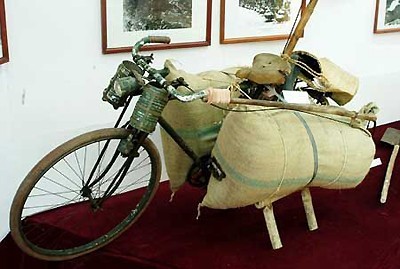
Pack-bikes, known as 'Iron horse', contributed greatly to the success of Dien Bien Phu campaign 60 years ago.
|
In early 1954, the Vietnamese government called on all its citizens to transport food to the troops fighting in the Dien Bien Phu campaign. Eight companies of 100 people including a female team were set up in Thanh Hoa province. Their task was to carry food from Thanh Hoa to Rut Stream in Hoa Binh province and from there to Son La and then on to Dien Bien.
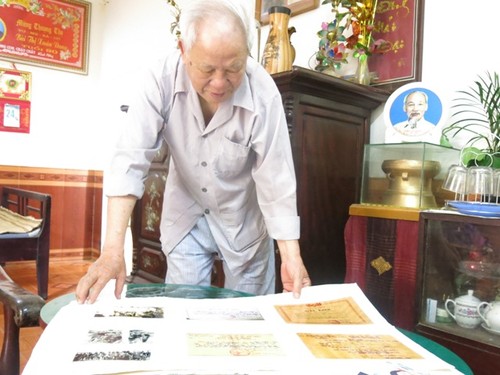 |
| Nghi by souvenirs he has kept for 60 years |
85-year-old Le Duc Nghi, who was in charge of training the companies, says pack-bikes were fashioned from bikes made in France or Czechoslovakia by fastening a one-meter bamboo pole to the handle bars to help the “driver” steer the bike more easily. Another bamboo pole was fastened to the seat tube to balance the bike. The frames were reinforced with iron rods or planks. The tires were covered with cloth to make them more durable. Each pack-bike could carry up to 300kg of supplies – three times the initial capacity of 100 kilograms. Nghi said: “at that time, our motto was ‘the military above all, and the front line the most important’. Everyone who was chosen was ardent and happy to serve the front line.”
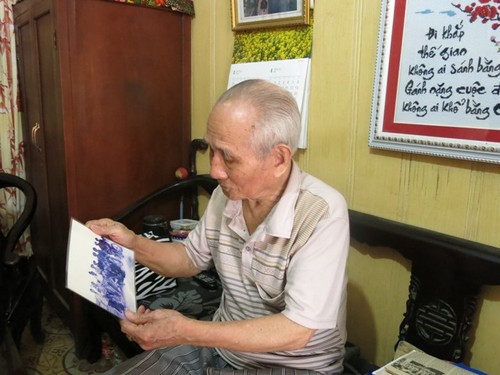 |
| Tran Khoi and the photo taken when he departed for transporting the supplies to to the troops on the Dien Bien Phu battlefield |
Tran Khoi, former political commissar of a company of Thanh Hoa pack-bike drivers, says he and his comrades departed on February 7th, 1954 from Dong Tien commune in Dong Son district for Xuan Lap commune, Tho Xuan district. Each person transported 50 kilograms of rice and none of them knew what the route would be. Khoi recalled: “there were many sloping passes and streams along the way. Volunteer youth forces made bamboo panels to help us carry the food more easily. We launched an emulation movement to increase the volume of rice transported to the frontline to feed the combat soldiers. One of our soldiers, Nguyen Van Dang, set a record by carrying almost 200 kilograms of supplies to the Dien Bien Phu Campaign.”
The companies of pack-bikes moved only at night. In the daytime they rested and studied. At nightfall they used torches or took advantage of the light of rockets fired by French aircraft to see the road well enough to move forward.
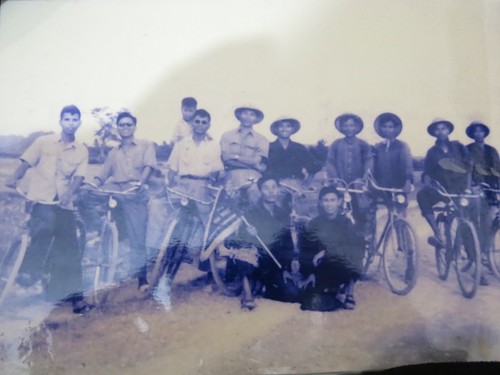 |
| Tran Khoi in black shirt, in the middle of the last row |
Khoi said to solve the numerous problems faced during the journey, they came up with many creative ideas. The first idea was to form teams of 3 or 4 people to help each other with breakdowns along the road. Whenever a bike went uphill, two bikes would stop beside the road. One person would pull the bike with a rope, another would push from the back, and one steered the bike.
According to Khoi, the hardest part was going down a steep slope, adding “the feet of many comrades were bleeding because they used their rubber sandals as a brake to keep the bikes from sliding downhill. Their hands got blisters and were swollen. After dressing their wounds, they continued the journey. Their shoulders developed calluses. Despite suffering from malaria, we always did our best to complete the mission. As we struggled along, we sang the song ‘Artillery pulling chant’ with a spirit of great determination.”
Among the forces transporting supplies to the Dien Bien Phu frontline were women who used pairs of bamboo frames to hold rice loads at the ends of carrying poles. With two 20-kilogram loads of rice on their shoulders, Thanh Hoa women traversed more than 500 km of forest roads, streams, and passes to the Dien Bien Phu battlefield.
Le Thi Mien, one of the female carriers, is now 93 years old. She says she carried supplies and did other tasks involved in moving, receiving, and delivering the cargo. Along the way, whenever any carrier was tired or injured, she would give a hand or give part of the load to others.
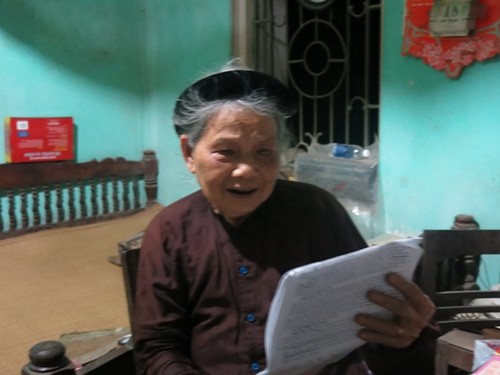 |
| Ms. Khue, now 87 years old, was deputy chief of a female company of 150 members |
Her sister Le Thi Khue, now 87 years old, was deputy chief of a female company of 150 members. She recalled: “at the time, we never thought about sacrifice or hardship. I just encouraged other women to work as a volunteer for the Dien Bien Phu campaign. At first our shoulders hurt. Then gradually, we got used to it and it felt normal. We sang, chatted, and laughed while carrying the supplies. These were narrow paths full of people carrying supplies, which made us more enthusiastic.”
These rudimentary means of carrying supplies, especially food, to the front made an enormous contribution to the victorious Dien Bien Phu Campaign.